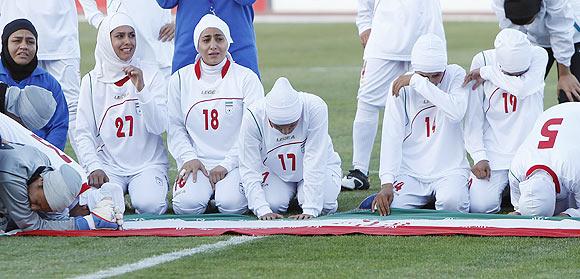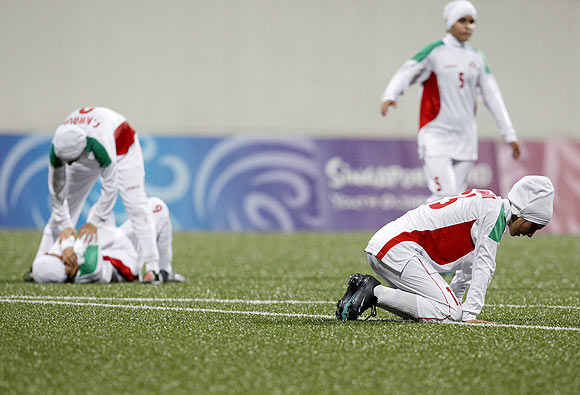 | « Back to article | Print this article |
United Nations urge FIFA to allow women to wear hijab
The United Nations has asked the world governing body FIFA to overturn its ban on allowing women footballers to wear a hijab, the Islamic headscarf, when its law-making body meets on Saturday.
Issa Hayatou, the president of CAF, the African confederation, and Zhang Jilong of China, the acting head of the Asian Football Confederation (AFC), have also given their support as have a number of Premier League players in England.
Prince Ali Al Hussein of Jordan, at 36 the youngest member of FIFA's executive committee, will address the International Football Association Board (IFAB) at its annual meeting in Bagshot, Surrey on Saturday.
He said on Thursday he would be very disappointed for millions of women players if IFAB did not sanction its use, reversing a decision it made in March 2007.
'It is not a religious garment'
Prince Ali, speaking to reporters in London, said: "It is a very important issue. It is not a religious garment, it is a matter of culture.
"Women's football has come a long way, as we experienced in the last Women's World Cup, and the present situation is saying to women world wide that you're not allowed to participate for a reason that makes no sense.
"That's prejudice. It's not fair. It has to be dealt with.
"Long sleeves and leggings are already allowed. This is not an issue of religious symbolism it is simply a case of cultural modesty and I'm tackling this now because it is a big issue for many, many women all across the world.
"I'd be very disappointed for the game if IFAB said No. It's an issue which will not go away. I'm optimistic this will happen. If not there will be lot of soul searching about what the priorities are in this sport.
"Everyone from the UN to the regional federations are supportive so I don't see what the problem is."
'FIFA would set a positive example'
The UN expressed its support through Wilfried Lemke, a special adviser on sport to UN secretary general Ban Ki-moon, who has written to FIFA President Sepp Blatter, expressing his support for the initiative.
Lemke's letter said the time has come to allow players to have "the right to wear a safe, Velcro-opening headscarf in FIFA-regulated matches and competitions".
In his letter, Lemke said that a change in legislation "would remove a barrier that can deter women and girls from participating in football" and would set "a positive example".
"It would send the message that each female player, from the top elite level down to the grassroots, has the freedom to decide whether or not to wear this particular piece of attire while on the field.
"It would give the opportunity for remarkable female athletes to demonstrate that wearing the headscarf is not an obstacle to excelling in life and sports and would hence contribute to challenging gender stereotypes and bringing about a change in mentalities."
'Opportunity for IFAB to show it can keep up with modern developments'
A number of sports already sanction the hijab including athletics, rugby, fencing, netball and taekwando and Prince Ali said that football now had the perfect opportunity to prove it was in keeping with the times.
IFAB upheld a ban on the hijab, introduced by the Quebec Soccer Federation, in 2007 for safety rather than religious reasons but he says those worries now no longer apply.
Extensive tests have been done on the garment's safety and there had never been an injury as a result of its use. The AFC has sanctioned its use at grassroots level.
IFAB, which is made up of four representatives from FIFA and four from the British associations of England, Scotland, Northern Ireland and Wales, has been inherently conservative since its inception in 1886, rarely changing soccer's laws.
"I respect the traditions of IFAB and this stance has been one of its strengths," the Prince said. "But now it has the opportunity to show it can keep up with modern developments in the game, and benefit millions of women not just in Asia, but around the world."
Any change or revision to the laws needs a 75 percent majority, meaning six of the eight men on the board must be in favour of the proposal.

© Copyright 2025 Reuters Limited. All rights reserved. Republication or redistribution of Reuters content, including by framing or similar means, is expressly prohibited without the prior written consent of Reuters. Reuters shall not be liable for any errors or delays in the content, or for any actions taken in reliance thereon.



